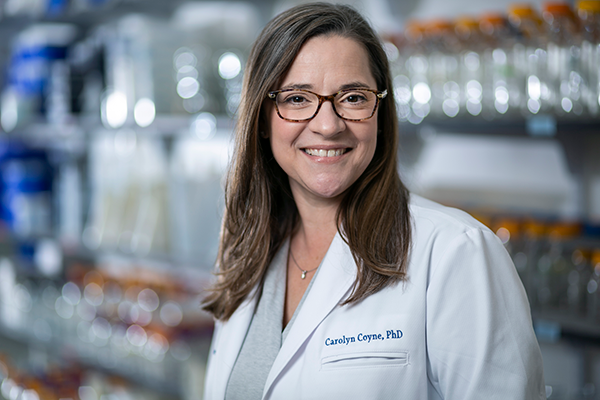
The human placenta performs a delicate balancing act: it must let beneficial nutrients pass from the mother to the developing fetus, but block harmful pathogens from making the same trip.
Most of the time, it succeeds. But certain pathogens have developed ways of evading the placental barrier and causing fetal illness.
Carolyn Coyne, PhD, investigates how the placenta has evolved to be such a fantastic protector but can also be vulnerable to pathogens such as cytomegalovirus and Zika virus that can bypass its protective barrier.
Coyne joined the Duke faculty in July 2021 as a professor in the Department of Molecular Genetics and Microbiology.
“What we’re really trying to do is identify the blockades that stop the virus from getting in, and we’ve done a really great job at that,” said Coyne. “But what’s been trickier to study is the detours that microorganisms like viruses and bacteria take to get in, or the methods by which, in some cases, they’re able to overcome the blockades.”
Coyne was drawn to Duke for its proximity to the Research Triangle Park and for the world-class scientists at Duke working in reproductive health, biology, and gastroenterology.
“Because we are a lab that studies lots of different things, one of the things that’s inherent to that type of science is the need to seek out other expertise,” said Coyne. “I remember that first morning on campus where it struck me that here are all of these amazing scientists with unique expertise within walking distance. Every person I met with ended our meeting saying, ‘Oh that would be really exciting, we should talk about this, maybe we could do this.’ That is the kind of environment as a scientist that you want to be in.”
More About Duke Science and Technology Research:
Support Duke Science and Technology
To support research and learn more about Duke Science and Technology, visit dst.duke.edu or email scienceandtechnology@duke.edu.
Story originally published in DukeMed Alumni News, Winter 2021